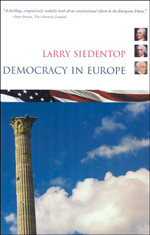 With the Internet’s rise, normally a first step in creating this book section is to type in a few key words on the issue’s theme and hit “search”—which I recently did with disappointing results. The key word “globalization” produced many titles, but most assumed an interest merely in economics. The idea that bread alone is not enough was strangely absent.
With the Internet’s rise, normally a first step in creating this book section is to type in a few key words on the issue’s theme and hit “search”—which I recently did with disappointing results. The key word “globalization” produced many titles, but most assumed an interest merely in economics. The idea that bread alone is not enough was strangely absent.
One exception was Democracy in Europe, Larry Siedentop’s exploration of political, cultural and religious attitudes standing between Europe’s current union mainly of producers and consumers and a wished-for union of citizens, able to command loyalty and elicit consent in governing the continent’s 350 million-odd inhabitants. For that kind of a union to emerge, Europeans would need a rights-based written constitution built around the values of a powerful common story, such as the one that offers Americans both a public identity and a sense of personal political security.
Moreover, as the world becomes spatially and culturally smaller a general lack of awareness of the values’ origins in Christianity makes it more difficult for both Americans and Europeans to defend them, not to mention understand themselves and others. Nonwesterners do not have that difficulty, however. Islamic fundamentalism, says Siedentop, “is a reaction against Western liberalism—a reaction which derives from the fact that, behind liberalism, Islam perceives Christianity at work.”
First published in Europe, Siedentop’s book is meant to remind us of Alexis de Tocqueville’s Democracy in America, written in the 1830s. But unlike de Tocqueville, who was struck by American democracy’s vitality, Siedentop, an American who has taught at Oxford for the past forty years, is struck by democracy’s frailty in Europe.
Siedentop proposes a number of reasons: one, as noted, is their leaders’ view of Europeans as consumers rather than citizens. Another is the habit of regarding pluralism as a process primarily concerned with groups, not individuals. Failure to make a distinction, he says, obscures important truths about the ways ethnic and religious groups, left to themselves, will choose to live together.
This pattern was first set by North African cities in the later Middle Ages where Muslims, Christians and Jews lived side by side. While often showing considerable de facto tolerance of one another’s beliefs and practices, these groups kept largely to themselves. In addition, the most powerful group, rather than the law, set the terms on which they co-existed. At best, weaker groups relied on established conventions, with their security and ability to practice their own beliefs depending entirely on sufferance. No accepted public framework of belief could be invoked to defend their autonomy or individual rights.
The root of the liberalism Siedentop so admires is Christianity, beginning with Charlemagne’s request in AD 792 for an oath of allegiance from every man (both freemen and some slaves), “to restore a stable empire for ‘the Christian people.’” Then, in 802, Charlemagne asked for another oath, this time from “all men” over the age of twelve, strengthening seeds already planted of an “assumption of moral equality” of all Christians.
To this legacy of medieval Christianity the Reformation added the more radical idea of individual liberty that led first to claims for conscience and then for a sphere of choice protected by rights. In due course, came the derivatives of tolerance, pluralism, and even skepticism. Tragically for the growth of European democracy, these two parts of the same idea became separated, when the church in many parts of Europe allowed itself to become part of the struggle between social privilege and protest. The result was a legacy of anticlerical and class-conscious politics that remains today and is one of the major obstacles to creating the larger identity the European Union so desperately needs now. Siedentop believes that if the connection between moral equality and the claim of equal liberty is not understood or accepted, then the moral foundation for a democratic society and representative government remains incomplete.
It is also why he finds the future of Islamic societies “both fascinating and troubling.” He feels the difficulties Islamic nations have repeatedly encountered in trying to establish representative government derive ultimately from such a moral cause. Denying the connection between moral equality and equal liberty makes it impossible to distinguish clearly between mere conformity and truly moral conduct. That confusion, in turn, plants the seed of tyranny.
“It has been the glory of Europe that it has created and, at least intermittently, defended that distinction. The future influence of Europe in the world—as well as its ability to create free pan-European institutions—will depend upon its becoming more conscious of that moral inheritance.”
Appetizer
The diluted or idealistic patriotism engendered by American federalism meant that ‘democracy’—at least as understood on the model of the American political system—became inextricable from national identity and national pride. That is what made the spread of American power and influence in the world in the twentieth century so ambiguous. What to hostile observers looks almost like the growth of an American empire, looks in American eyes simply like the spread of democracy—that is, of the institutions of self-government and a free market, founded on respect for human rights.



























